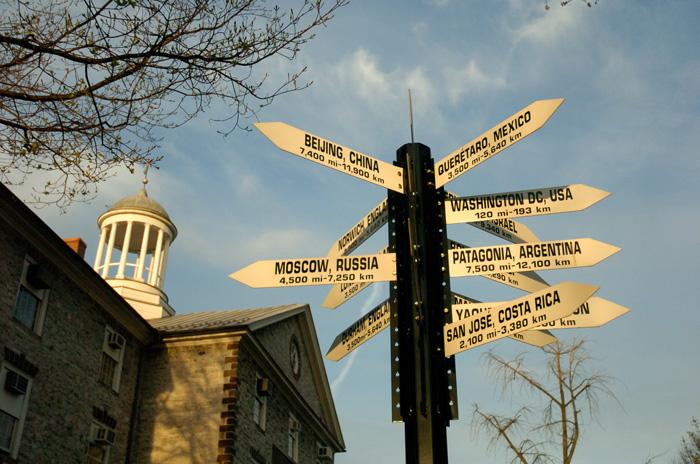Passports to Success

Photo by Carl Socolow '77.
Alumni share benefits of study abroad in business, finance careers
by MaryAlice Bitts-Jackson
Leah McNamara ’13 already had traveled internationally with her family before she headed to Norwich, England, for her junior year abroad. But even this seasoned adventurer was taken aback when she discovered, while applying for a high-level internship, that she’d need to have her fingerprints taken at London’s Scotland Yard. “It was daunting at first,” remembers McNamara, who, after booking an appointment and finding her way to an unfamiliar city in a foreign land, then had to brave the bureaucratic waters that churn the gears of the venerable 180-year-old police service. “And in the end, I did it, and it makes for a good story now.”
McNamara’s experience is emblematic of the big and small ways that Dickinson's study-abroad students learn to get things done while adapting to new places and cultures. And these experiences can make a world of difference for students interested in international business and finance careers.
Joining the global citizenry
First, there are the basic benefits that arise from moving out of one’s comfort zone. Recognized as a top-5 college for long-term study abroad, Dickinson offers meaningful international experiences that come from deep immersion rather than simply touring the globe. Those experiences build up resourcefulness and strengthen general problem-solving skills, says McNamara, a former economics major who was recently promoted from Wells Fargo country officer to business manager for the Supranationals, Sovereigns and Agencies area within Wells Fargo’s Global Financial Institutions group. To her delight, she finds solutions across cultures and time zones every day.
Tamoghna Ghosh ’07, an international student and computer-science major at Dickinson, who gained global experiences right on campus and then broadened his travels further while pursuing an MBA at Duke University, says the opportunity to see himself through the lens of another culture accelerated the self-discovery process, allowing him to more quickly fine-tune his career.
Immersed in the cultures of their host countries, Dickinson's study-abroad students also must be able to read, and adapt to, a new culture, a key skill in the modern work environment, says Ghosh, who worked for two international firms and now is an associate marketing manager at the global food-manufacturing giant General Mills. “People [across fields] will likely see changes in bosses, teams, cultures and even jobs—not to mention enormous changes in the business environment itself—and the ability to adapt is paramount,” he says.
And here is where study-abroad students pursuing careers in business and finance shine, says Ruth Ferguson ’92, Senior Vice President for Bank of America Merrill Lynch and a Dickinson Trustee, since study-abroad students must not only adapt to sweeping changes, but also to nuanced cultural differences that underlie a globalized economy.
Targeted conversations
To assimilate abroad, students must learn to navigate the complexities of cross-cultural conversation—how to deeply understand, and make one’s self understood, by people whose experiences, value systems and cultures may be different from their own. That skillset translates directly to the international marketplace, as organizations look to motivate, influence, innovate, learn, collaborate and lead across global divides.
“In America, we're very open to listening to people, and we presume that if they speak well, and loudly, then their voices will be heard,” says Ferguson, who lived abroad for several years while heading the human-resources division for Bank of America Merrill Lynch’s Asia Pacific Region. “But in other cultures, simply having a loud voice isn't necessarily the key to having influence, being able to explain complex problems, influence client behavior and solve client problems is.”
“So you need to recognize that the American or Western way of doing things isn’t always the best way, because the power of influence and the values of how people learn and receive information can change,” she continues. “Experiencing a new culture firsthand is one of the best ways to train to work in a global organization, and the lessons you learn abroad stay with you throughout your career.”
Meaningful, lasting connections
So too can a study-abroad student’s professional contacts, says Samantha Brandauer ’95, director of education abroad with Dickinson's Center for Global Study & Engagement. She notes that students who take part in Dickinson study-abroad programs may tap the college’s vast network of programs and partnerships, and this allows students who study, volunteer and/or intern abroad through Dickinson programs to build an international professional network.
"Dickinson has been offering study-abroad programs, and has been building sustained, meaningful partnerships with partner institutions and organizations around the world, for decades," says Brandauer, noting that the college celebrated the 50th anniversary of its Bologna program and 30th anniversaries of its Bremen, Norwich and Moscow programs, in fall 2015. "So our partner organizations and institutions have a vested interest in the college and, therefore, a vested interest in student success."
As McNamara notes, those worldwide contacts are vital in today’s global business and finance realms. The icing on the cake? The international frames of reference Dickinson's study-abroad students gain—in her case, that includes a Scotland Yard adventure story and working knowledge of London, Norwich and the Premier League—can help continue to build conversational bridges with interviewers, colleagues, clients and fellow travelers throughout one’s career.
“Making connections is so important in business,” says McNamara, “and the skills and connections that come from studying abroad can really set you apart from the crowd.”
If you're a Dickinsonian working in business or finance who studied abroad, email stories@dickinson.edu to let us know how your global experience helped prepare you for your career.
Learn more
- “The World Calls (and Dickinson Answers)”
- “The Past, Present and Future of Global Education”
- “Vanguards of Global Finance”
- “Life-Changing Experience” (Leah McNamara ’13)
- Global Study & Engagement
- Latest News
Published January 15, 2016